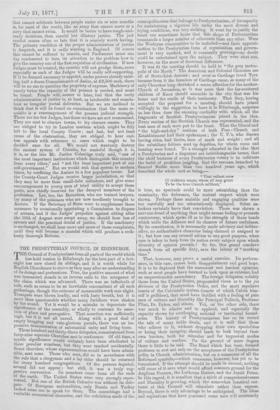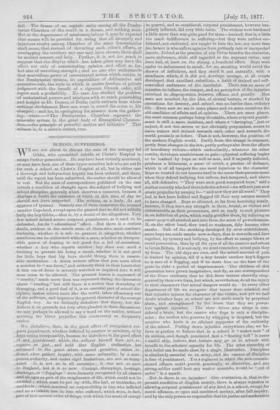THE PRESBYTERIAN COUNCIL IN EDINBURGH. T HE Council of Presbyterians from
all parts of the world which has held session in Edinburgh for the best part of a fort- night has now closed its sittings, and it is worth while for English Churchmen to strive as they may after an understanding of its doings and pretensions. True, the positive amount of what was transacted stands in an inverse ratio to the arrogance of the claim which was advanced. There was an infinitude of talk, such as seems to be an inevitable concomitant of all such gatherings, though the outcome of mensurable work was slight. Trumpets were blown loudly, and with lusty breath, but it is more than questionable whether many Jerichoes were shaken by the sound. Yet it would be a mistake to depreciate the significance of the assembly, or wholly to contenan its asser- tion of place and prerogative. That assertion was sufficiently high, but it is not all unreal. Along with a good deal of empty bragging and vain-glorious parade, there was an im- pressive demonstration of substantial unity and living force. Three hundred and thirty-three delegates, coramispioned from forty-nine separate Churches met in conference. Of old time, a mystic significance would certainly have been attributed to these peculiar numbers, but they were reached accidentally. Some churches, whose representatives would have been admis- sible, sent none. Those who sent, did so in accordance with the rule that a clergyman and a lay elder should be returned for every hundred congregations. Of the persons deputed, several did not appear ; but still, it was a truly sug- gestive convention. Its members came from all the ends of the earth. The United States were very strongly repre- sented. Not one of the British Colonies was without its dele- gate. Of European nationalities, only Russia and Turkey lacked some one to speak for them. The assemblage had a veritable (ecumenical character, and the exhibition made of the cosmopolitanism that belongs to Presbyterianism, of its capacity for maintaining a vigorous life under the most diverse and trying conditions, was very striking. It went far to justify the boast one sometimes hears that this shape of Protestantism commands a larger number of adherents than any other. Were the Wesleyan communities to be included—and their approxi- mation to the Presbyterian form of organisation and govern- ment is very marked, and is constantly growing—no doubt could be entertained upon the subject. They were shut out, however, on the score of doctrinal difference. It was fit the meeting should be held in "the grey metro- polis of the North." The American and Colonial Churches are all of Scoto-Irish descent ; and even' as Carthage loved Tyre because from it the founders of Carthage came, as many of the early Churches long cherished a warm affection for the mother- Church of Jerusalem, so it was meet that the far-scattered children of Knox should assemble in the city that was his home and the cradle of their testimony. That they, having accepted the proposal for a meeting, should have joined willingly in the suggestion to have it in Edinburgh, surprises us less than does the amazing cordiality with which all the fragments of Scottish Presbyterianism joined in the idea. Every section of the Scottish Church was represented, and the best men of each were put to the front. Thus the liberal and "the high-and-dry" sections of both Free - Church and Establishment had their spokesmen ; the U. P.'s, who disown having sides, had theirs, men of mark and weight ; and all the subsidiary fritters sent up deputies, for whom room and hearing were found. To a stranger educated in the idea that a Presbyterian and a disputant are interchangeable terms, that the chief business of every Presbyterian votary is to cultivate the habit of profitless jangling, that the sarcasm launched by Samuel Butler more than two hundred years ago, which described the whole sect as being,-- " That valiant crew
Of stubborn saints; whom all men grant To be the true Church militant,"
is true, no spectacle could be more astonishing than the unanimity, the deference, the mutual respect which were shown. Perhaps these amiable and engaging qualities were too carefully and too ostentatiously displayed. Sober on- lookers certainly have that conviction. There was shown a nervous dread of anything that might arouse feeling or promote controversy, which spoke ill as to the strength of those bonds which unite the Alliance and its chances of future usefulness. By its constitution, it is necessarily made advisory and deliber- ative, no authoritative character being claimed or assigned to it ; but how can any council advise to any good purpose, when care is taken to keep from its notice every subject upon which diversity of opinion prevails ? So far, this grand conclave shrank from all specific duty, save the labour of "marking time."
That, however, may prove a useful exercise. Its perform- ance, in this ease, causes both disappointment and good hope. It is to be deplored that the narrowest and hardest opinions, such as most people have learned to look upon as extreme, had an unquestionable ascendancy. The foreign delegates, notably those from the United States, propounded views as to the jus divinunt of the Presbyterian Order, and the most repulsive tenets of the Calvinistic system (tenets of which Calvin him- self is guiltless), that must have thrilled with a feeling of pain men of culture and liberality like Principal Tulloch, Professor Flint, Dr. Dykes, and others. Yet, on the other side, there was much to admire and to applaud, and especially the capacity shown for overleaping national or territorial bound- aries. The history of Presbyterianism has on its record the tale of many noble deeds, and it is well that those who adhere to it, without dropping their own specialities or losing their integrity, should learn to look beyond their own borders, both for stimulus and for improved modes of culture and warfare. On the ground of mere dogma there is little to be said. The Build which has been formed the acceptance of the Presbyterian professes to rest not only on polity in Church administration, but on a consensus of all the Reformed symbols,—which consensus, however, has yet to be formulated. If the attempt should he made in earnest, nothing will come of it save what would afford common ground for the Anglican Pearson, the Lutheran Dorner, and the Jesuit retail. In this regard, it is manifest that a spirit of comprehensiveness and liberality is growing, which the somewhat fanatical out- burst at this Council will stimulate rather than repress. Beyond, there is only advantage to be anticipated. The ideas and aspirations that have possessed some men will necessarily fail. The dream of an organic unity among all the Presby- terian Churches of the world is a dream, and nothing more. But in the department of missionary labour it may be expected that means will be provided for seeing that all unseemly and injurious rivalry among Churches of the same denomination shall cease, that instead of thwarting each other's efforts, or overlapping the territory any one may have chosen, there shall be mutual concert and help. Further, it is not too much to suppose that the display which has taken place may have the effect not only of concentrating opinion and effort so fax, bat also of recruiting strength ; and no one who understands that marvellous power of concentrated action which resides in the Presbyterian system, its capabilities of deliberative and executive rule, the style in which it unites freedom of private judgment with the benefit of a vigorous Church order, will regret such a probability. No man has studied the problem of ecclesiastical powers and relations with so much painstaking and insight as Dr. Dorner, of Berlin (with extracts from whose writings Archdeacon Hare was wont to crowd the notes to his charges) ; and he, in apologising for absence from the gather- ing, • wrote The Presbyterian Churches represent the muscular system in the great body of Evangelical Christen- dom,--the principle of powerful motive and initiative." This witness is, to a certain extent, true.































 Previous page
Previous page